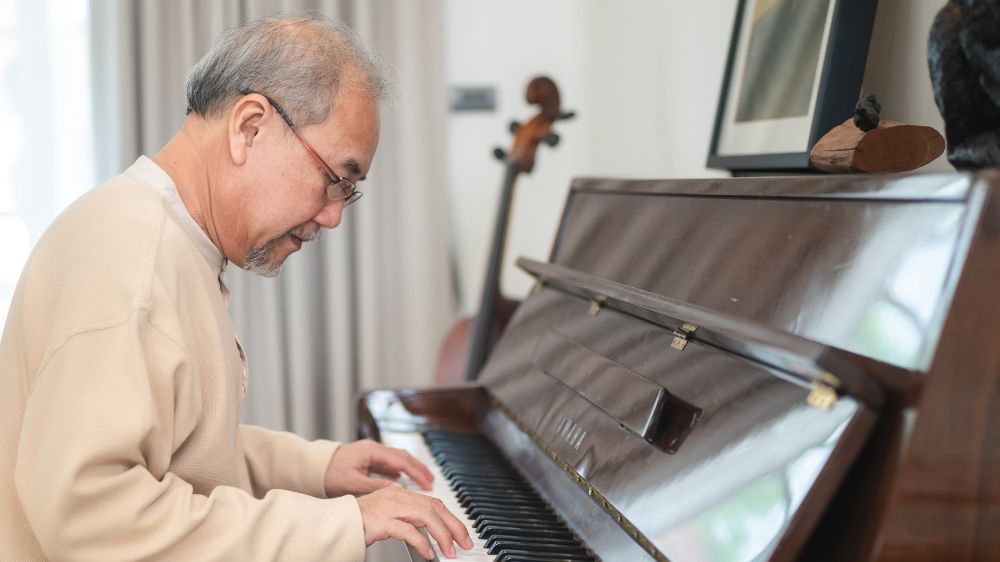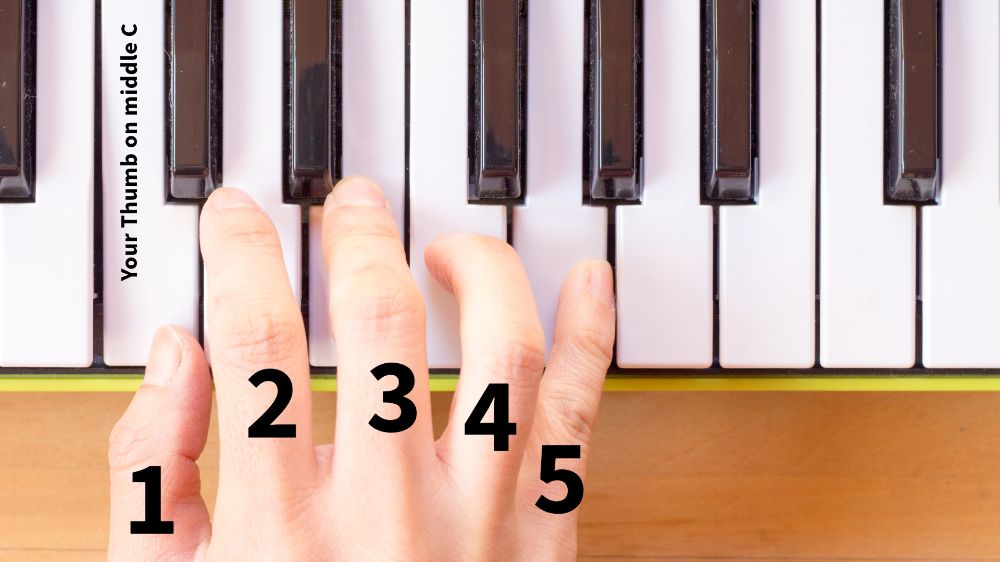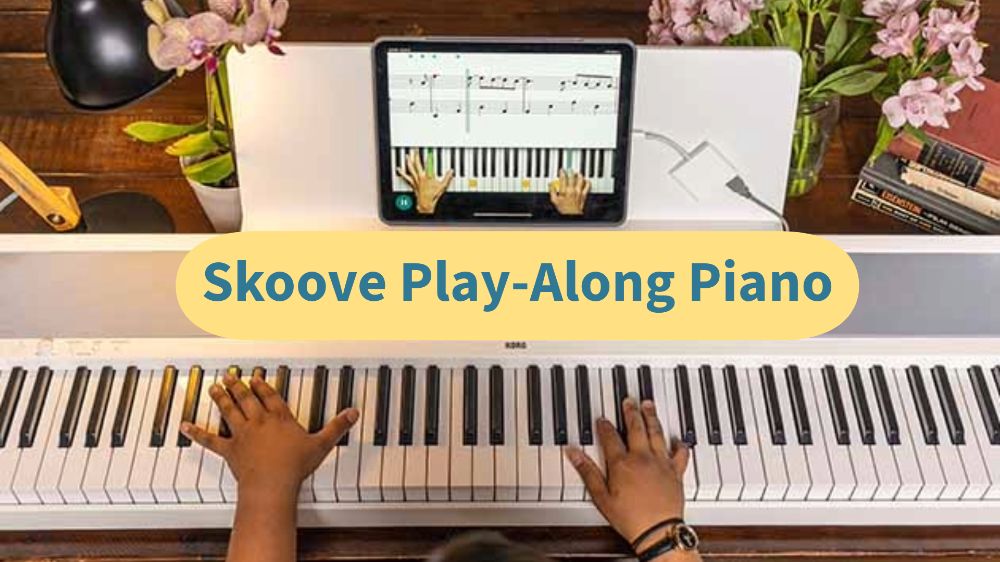The 10 Baby Steps Approach to Playing The Piano As an Adult

1. Buy an Affordable Starter Keyboard
Nothing gets started if you don’t have a piano in your house. However ,what you don’t want to do is wait until you can afford a baby grand piano. Investing in a keyboard is a practical first step to embark on your musical journey. Several affordable options are available, ranging from portable keyboards to full-sized digital pianos. Choose a model that feels comfortable to you. This will encourage regular practice. A keyboard with weighted keys can simulate the feel of an acoustic piano, which is helpful if you decide to upgrade later. With a keyboard at home, you are saying “I’m ready to graduate from watching others playing the piano on YouTube and I’m ready to start playing the piano myself.” This starter initial investment lays the foundation for practice, removes the expense excuse and helps establish a routine of playing and studying.
2. Play Some Songs Using the Finger Numbering Method

With the finger numbering method, your thumb is number 1 and your pinky finger is number 5. When I first started playing the piano, the instructor didn’t even try to teach me notes or keys or anything like that. He taught me something I understood, counting to 5. I still remember my first song. You can try it too. You just play it with one hand. It goes like this:
1,3,5,3
4,2,3,5,
1,3,5,3
4,2,1.
Once you have your keyboard, familiarize yourself with the finger numbering method, which is a great confidence booster for beginners. This straightforward technique helps you understand finger placement and coordination, making it easier to learn songs. Start with simple melodies that are easy to follow, allowing you to practice the basics without feeling overwhelmed. As you gain confidence, gradually incorporate more complex pieces into your practice. Familiarizing yourself with finger placements will build your dexterity and help you develop the muscle memory needed for more advanced playing. Remember, the goal is to enjoy the process, without putting too much pressure on yourself, while honing your skills.
3. Grab Some Inspiration from Adult Learners
Many famous musicians began their piano journey as adults, proving that it’s never too late to learn. Notable figures like Justin Timberlake took up piano later in life. Their stories can serve as powerful motivation, reminding you that success comes from hard work and commitment rather than age.
Recognize any of these other late in life piano players?
- Adrien Brody
- Holly Hunter
- Dirk Bogarde
- Tom Cruise
- Kobe Bryant
As you can tell by a few of the names, these are actors who needed to play the piano in a movie, and then just decided to learn the piano. Kobe Bryant had a more romantic reason. He just wanted to play a song for his wife. Knowing that accomplished musicians overcame obstacles similar to yours can provide encouragement when you encounter your own struggles as an adult piano player.
4. Don’t Try to Be Chopin in Your First Year
Setting realistic expectations is a must for any new piano player. Be patient with yourself. It’s important to understand that mastering the piano takes time and effort. Trying to play long, intricate pieces in your first year can lead to frustration and disappointment. Every musician starts as a beginner, and developing your skills is a gradual process. Instead of attempting difficult pieces, focus on celebrating small achievements along the way. Whether it’s playing a simple scale or playing a simple song without mistakes, setting reasonable goals is the name of the game. Rather than frustrating yourself by focusing on difficulty level, focus on consistency. This will lead to improvement over time.
5. Set up a Piano Schedule That Is Reasonable
Creating a practice schedule is a big part of making progress, but it’s equally important to keep it realistic. Setting yourself up for success means understanding your own limits. If you can only dedicate one hour per week, then focus on making that hour count. Break your practice into manageable sessions, perhaps focusing on different skills each time, like scales, chord progressions, or song practice. Consistency often beats intensity; short, regular practice sessions are usually more beneficial than infrequent, lengthy ones. Find a routine that fits your lifestyle, and you’ll be able to enjoy your learning journey without feeling overwhelmed. Always stay engaged and committed, making adjustments as needed to maintain balance.
6. Consider Piano Software Programs
Yes. There’s an app for that. Piano apps can enhance your learning experience significantly by allowing you to play along with the app. A lot of apps are designed to connect to your keyboard and provide interactive lessons, real-time feedback, and gamified learning experiences. These tools can help you track your progress and keep you motivated. For instance, programs like Simply Piano or Flowkey offer step-by-step guidance tailored to your skill level, making practice more engaging. Explore these options to find a software that suits your learning style, and don’t hesitate to mix traditional practice with these modern resources. Using technology can make your learning journey more dynamic and enjoyable, and provide just a better overall experience.
7. Find Other Adults Learning the Piano

Connecting with fellow adult learners can provide a sense of community and support, which is a big part of any learning endeavor. Look for local groups, online forums, or social media groups where you can share experiences, tips, and encouragement. Engaging with others on a similar journey can help you stay motivated and accountable, as you share struggles and celebrate victories together. Learning alongside others can make the process more enjoyable, transforming practice into a social experience. Additionally, you might discover opportunities for group lessons or meet-ups, enriching your learning journey even more and creating friendships that can last a lifetime.
8. Don’t Assume Expensive Piano Lessons Are the Only Way
While traditional piano lessons can be beneficial, they aren’t the only path to learning to play the piano. Many resources are available, including online tutorials, instructional videos, and free sheet music. Some successful pianists have taught themselves through these alternative methods, proving that learning is possible without a hefty investment. Explore different learning avenues, such as community classes or online courses, to find what works best for you. Concerned about an extra monthly bill for piano lessons, consider a piano program where you purchase the program and own it for life. The goal is to ensure your journey remains enjoyable and accessible. Don’t underestimate the value of self-directed learning; with dedication and the right resources, you can develop your skills effectively.
9. Set a Date to Play Your First Full Song
Having a goal can significantly boost your motivation. Set a specific date by which you would like to play your first song. This timeline gives you something concrete to work toward and helps structure your practice sessions. As the date approaches, the excitement of reaching this milestone will inspire you to dedicate time to practicing. To make it even more special, choose a song that you love like a pop song, or a song that has special memories for you. Knowing that you learned how to play that song will provide the inspiration to learn to play your second, third, fourth and fifth full song. It’s about the joy of playing, so enjoy the experience as you work toward your goal.
10. Plan to Play for Others

After you’ve gained some confidence in your playing, consider setting a date to perform publicly, whether at a family gathering, a dinner party, or even at your church. Sharing your music with others is a rewarding experience that can boost your confidence and solidify your skills. Performing can be nerve-wracking, but it’s also a chance to show your hard work and dedication. Remember, the goal is to enjoy playing and sharing your love of music rather than striving for perfection. Embrace the opportunity to connect with others through your performance, and let it serve as a reminder of how far you’ve come in your musical journey.
I hope that I’ve been able to show you that you can learn to play the piano, even as an adult. The most important thing is to have fun, celebrate small goals and not try to become a concert pianist overnight. Better yet, take action and start playing the piano today.

